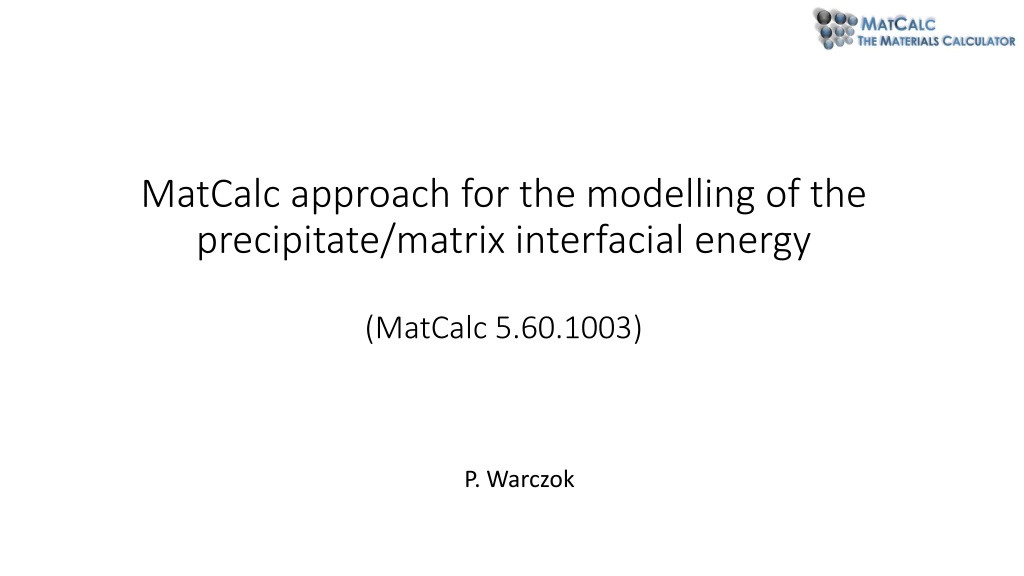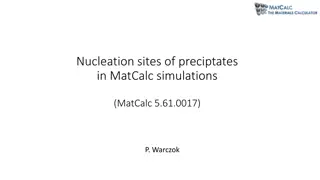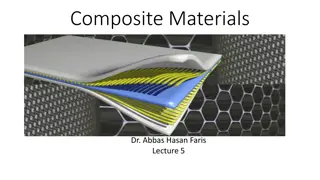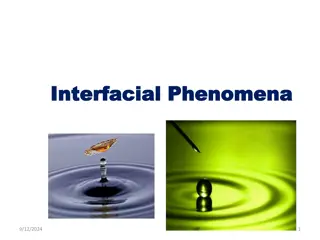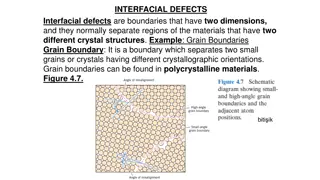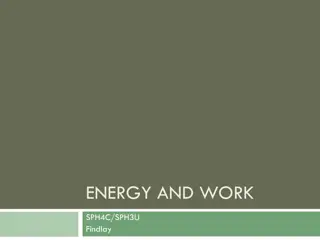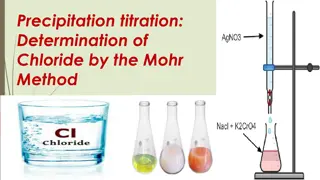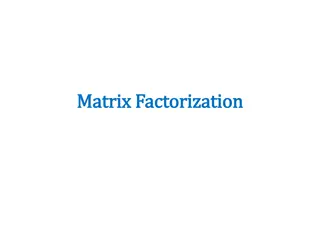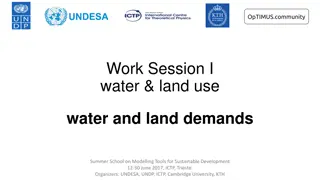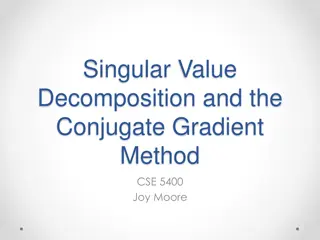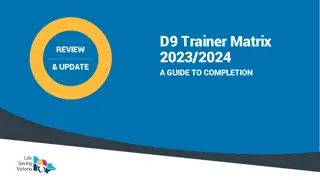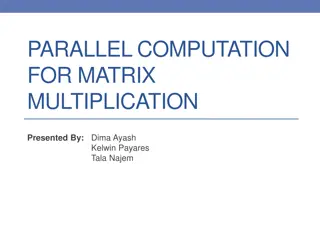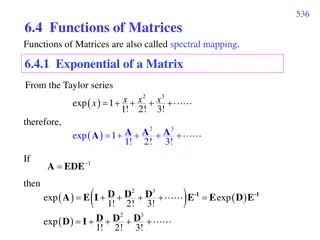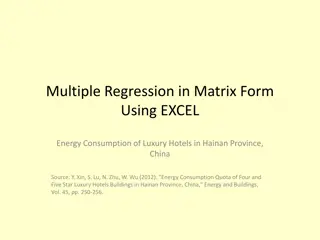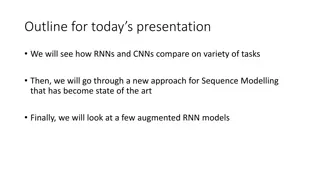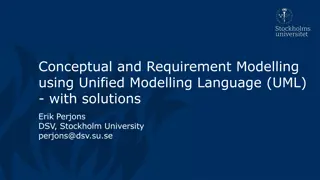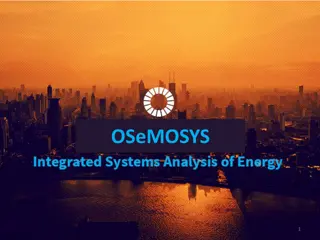Understanding MatCalc Approach for Modelling Precipitate/Matrix Interfacial Energy
MatCalc app provides a detailed examination of the precipitate/matrix interfacial energy modeling by considering various contributions to Gibbs energy, classical nucleation theory, coarsening (Ostwald ripening), and estimation methods like the Becker concept. The interface energy is crucial for understanding the behavior of materials in various conditions.
Download Presentation

Please find below an Image/Link to download the presentation.
The content on the website is provided AS IS for your information and personal use only. It may not be sold, licensed, or shared on other websites without obtaining consent from the author. Download presentation by click this link. If you encounter any issues during the download, it is possible that the publisher has removed the file from their server.
E N D
Presentation Transcript
MatCalc approach for the modelling of the precipitate/matrix interfacial energy (MatCalc 5.60.1003) P. Warczok
Outline What is it all about? Why do we care? How do we estimate it? Planar sharp interface Curvature correction Diffusive interface
What is it all about? Various contributions to Gibbs energy ? Gibbs energy ? = ????+ ????+ ? ? ?? - Number of moles of i -species ?? - Chemical potential of i -species Chemical part Interfacial part ?? - Area of k -interface Interfaces considered Precipitate/matrix interface Grain boundary Subgrain boundary ?? - Interfacial energy of k -interface
What is it all about? Various contributions to Gibbs energy ? = ????+ ????+ ? ? Interfacial contribution dependent on the dispersion
What is it all about? Various contributions to Gibbs energy ? Internal energy ? = ????+ ????+ ? Enthalpy ? ? ? Free energy ? Entropy ? pressure Various derivatives ? Volume ?? ?? ?? ?? ?? ?? ?? ?? ? = = = = ?,?,??,?? ?,?,??,?? ?,?,??,?? ?,?,??,??
Why do we care? Classical Nucleation Theory 16??3 ?~??? ? ? = 2 3 ?? ??+ ??? ?? ?? ? Nucleation rate ?? ?? - Chemical contribution of nucleation Gibbs energy ? Gas constant ??? - Mechanical contribution of nucleation Gibbs energy ?? - Molar volume of the matrix ? Temperature ? - Critical nucleation energy
Why do we care? Coarsening (Ostwald ripening) ??? ??? 8?? ? ?? 3= 3+ ????? ????= ? ? ? ? ?0 ??? 9 ?? ? - Solute concentration in the matrix ? time ?? ? - Solute concentration in the precipitate ? ? Mean radius at time t ?? ? - Diffusion coefficient of solute in the matrix ?? - Molar volume of precipitate phase ??
How do we estimate it? Becker concept ?2 ? = ?1 4+ ?3 2 Becker R., Ann. Physik 32 (1938) 128-140
How do we estimate it? Source of energy chemical bonds ??1= ??????1 ? ? ??????? ???? ??1= ?? - Number of atoms per interface area ?? - Number of bonds between the nearest neighbors broken by the interface
How do we estimate it? Source of energy chemical bonds ??2= ??????2 ? ? ??????? ???? ??2=
How do we estimate it? Source of energy chemical bonds ??1/?2= ??????1/?2 ? ? ??????? ???? ??1/?2=
How do we estimate it? Becker concept ?2 = ????2??1/?2 ??1 ??2 = ????? ? = ?1 4+ ?3 2 ? = 2??1/?2 ??1 ??2
How do we estimate it? Using Turnbull concept + + ???? = + ??1 = ??1??1 ??2 = ??2??2 ??1/?2 = ??1 ??1/?2??1+ ??1/?2??1/?2 ??1/?2 = ??2 ??1/?2??2+ ??1/?2??1/?2 ?? - Number of bonds in phase i ??/? - Number of bonds on the interface between phase i and j Turnbull D., Impur. Imperf. 32 (1955) 121-143
How do we estimate it? Using Turnbull concept + + ???? = + ????= 2??1/?2 ??1 ??2= ??1/?22??1/?2 ??1 ??2 = ????? ?? - Number of solute atoms ??1/?2= ???? ? = 2??1/?2 ??1 ??2 ?? - Number of nearest neighbors
How do we estimate it? Planar sharp interface. Nearest neighbor broken bond (NNBB) model ??,?? - dependent on the interface orientation ?? - dependent on the matrix crystal structure ??= ?? ???? taken as ????????,????????,?? ????????,?? ??????,?? ?????=???? ????=???? ???? ???? ?????,??=0
How do we estimate it? Planar sharp interface. Generalized broken bond (GBB) model Reaching beyond the nearest neighbors
How do we estimate it? Planar sharp interface. Generalized broken bond (GBB) model 23 ??= ???? ???? 0.329 ????????,?? ??????,?? ????????,?? ??????,?? ????,??,? =???? 2 1 = 0.329 ???? 3 ???? Sonderegger B. Kozeschnik E., Metall. Mater. Trans A. 40A (2009) 499-510
How do we estimate it? Planar sharp interface. Generalized broken bond (GBB) model 23 ??= ???? ???? 0.329 ????????,?? ??????,?? 2 1 ????,??,? = 0.329 ???? 3
How do we estimate it? Planar sharp interface. Generalized broken bond (GBB) model 23 ??= ???? ???? 0.329 ????,??,? - user defined
How do we estimate it? Planar sharp interface. Generalized broken bond (GBB) model 23 ??= ???? ???? 0.329 ????????,?? ??????,?? 2 1 ????,??,? = 0.329 ???? 3
How do we estimate it? Spherical correction factor ? ? Moving from planar to spherical interface Recounting the broken bonds Sonderegger B. Kozeschnik E., Scr. Mater. 60 (2009) 635-638
How do we estimate it? Spherical correction factor ? ? ????,?? = ????,??? ? 2 6 11 ?1 ? 10? 3?1 ?1 ? ? ? = 1 + 0.8921 + 0.045?? ?1 - Nearest neighbor distance (2.48*10-10 m)
How do we estimate it? Spherical correction factor ? ? ????,?? = ????,??? ? 2 6 11 ?1 ? 10? 3?1 ?1 ? ? ? = 1 + 0.8921 + 0.045?? ?1 - Nearest neighbor distance (2.48*10-10 m)
How do we estimate it? Spherical correction factor ? ? ????,?? = ????,??? ? 2 6 11 ?1 ? 10? 3?1 ?1 ? ? ? = 1 + 0.8921 + 0.045?? ?1 - Nearest neighbor distance (2.48*10-10 m)
How do we estimate it? ? Solute fraction Diffuse interface correction factor Moving from sharp to diffuse interface Recounting the broken bonds again Sonderegger B. Kozeschnik E., Metall. Mater. Trans A. 41A (2009) 3262-3269
How do we estimate it? Diffuse interface correction factor. MatCalc application Two intermediate layers (one on each side of the interface)
How do we estimate it? Diffuse interface correction factor Concept of critical temperature of regular solution 1 phase region 2 phases region
How do we estimate it? Diffuse interface correction factor. MatCalc application Minimization of Gibbs energy of the system T/Tc = 0 T/Tc = 1
How do we estimate it? Diffuse interface correction factor. MatCalc application Evaluation of interfacial energy (broken bond counting ) A B C D ????,????= ???+???+??? +???+???+??? 0 < T/Tc < 1
How do we estimate it? Diffuse interface correction factor. MatCalc application Numerical solution ? ?? ? = ????,????= ????,? ? 8.4729?6 26.691?5+ 32.717?4 17.674?3+ 2.2673?2 0.09? + +1.00047632 , for K > 0.07 ? = , otherwise 1
How do we estimate it? Diffuse interface correction factor. MatCalc application Numerical solution ? ?? ? = ????,????= ????,???,? ? 8.4729?6 26.691?5+ 32.717?4 17.674?3+ 2.2673?2 0.09? + +1.00047632 , for K > 0.07 ? = , otherwise 1
How do we estimate it? Diffuse interface correction factor. MatCalc application Numerical solution ? ?? ? = ????,????= ????,???,? ? 8.4729?6 26.691?5+ 32.717?4 17.674?3+ 2.2673?2 0.09? + +1.00047632 , for K > 0.07 ? = , otherwise 1
Examples MatCalc website E10 (finding minimal nucleation barrier, binary system) E11 (finding minimal nucleation barrier, ) P80 (application to Fe-Cu precipitation kinetic simulation)
